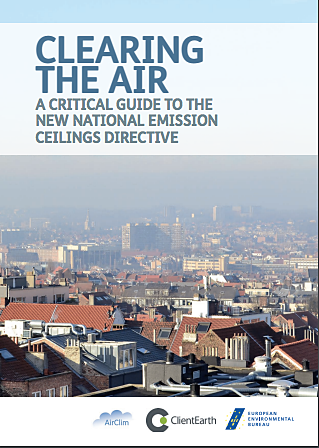 The non-profit European Environmental Bureau (EEB) is hailing a European Commission move toward legal action against France, Germany, Italy, Spain and the United Kingdom for failing to protect their citizens from air pollution, particularly nitrogen dioxide.
The non-profit European Environmental Bureau (EEB) is hailing a European Commission move toward legal action against France, Germany, Italy, Spain and the United Kingdom for failing to protect their citizens from air pollution, particularly nitrogen dioxide.
The commission has censured the five countries for failing to comply with the air-quality standards European law requires. The next step in its infringement proceedings will be to pursue legal action against the countries at the European Court of Justice.
The EEB is a federation of more than 150 organizations that protect nature and the environment in more than 30 countries. Those nations include virtually all European Union members, as well as countries pursuing EU membership and neighboring nations. The umbrella organization represents 15 million individual members and supporters.
Many health problems in the five countries are the result of high levels of nitrogen dioxide, the EEB said. They include wheezing, coughing, bronchitis and lung infections. Children with asthma and older people with heart disease are particularly vulnerable to NO2, the EEB said. The organization said the EU’s censure came after years of the five nations breaching air-quality standards.
 “What the European Commission is doing today is essential,” Louise Duprez, the EEB’s Senior Policy Officer on Air Pollution, said in a press release. “EU air pollution laws are designed to protect our health. There’s no excuse for countries that fail to implement these laws properly. Children growing up in urban areas deserve better than to be forced to inhale toxic fumes known to cause bronchitis, asthma and other conditions. People all over Europe will welcome the European Commission’s action on this issue.”
“What the European Commission is doing today is essential,” Louise Duprez, the EEB’s Senior Policy Officer on Air Pollution, said in a press release. “EU air pollution laws are designed to protect our health. There’s no excuse for countries that fail to implement these laws properly. Children growing up in urban areas deserve better than to be forced to inhale toxic fumes known to cause bronchitis, asthma and other conditions. People all over Europe will welcome the European Commission’s action on this issue.”
The censure came just weeks after the EU agreed on new emission limits. In a report explaining the revised limits, the EEB said air pollution causes  more than 430.000 deaths in the EU annually, a rate exceeding a thousand per day.
more than 430.000 deaths in the EU annually, a rate exceeding a thousand per day.
The report, “Clearing the Air: A critical guide to the new National Emission Ceilings Directive,” notes that EU countries must put in place policies necessary to meet the new standards. Some limits take effect in 2020 and some in 2030.
The report said the new limits will help France, Germany, Italy, Spain and the U.K. reduce pollution to the point that 78,000 lives are saved.
The EEB cautioned, however, that European Commission oversight will be essential to EU member states complying with the standards.
The European Commission said in 2013 that it wanted the new Clean Air Programme for Europe to begin reducing pollution in 2020, with a target date of 2030 for all standards being met.
The two EU’s key regulations on air quality are The Ambient Air Quality Directive, which limits pollutants, and The National Emission Ceiling Directive, which caps four specific pollutants: nitrogen oxides (NOx), non-methane volatile organic compounds (NMVOCs), sulphur dioxide (SO2) and ammonia (NH3). The limits cover pollutants that can impact respiratory health, contribute to soil and surface-water acidification, deplete oxygen in bodies of water that are in sensitive habitats, and increase ozone to levels that damage vegetation.
The EEB said more than 130 cities in 23 of the 28 EU countries exceed the Ambient Air Quality Directive standards. Cars and trucks, particularly those running on diesel, are a major source of NO2.
Sources:
European Environmental Bureau (EEB)
Clearing the Air: A critical guide to the new National Emission Ceilings Directive
